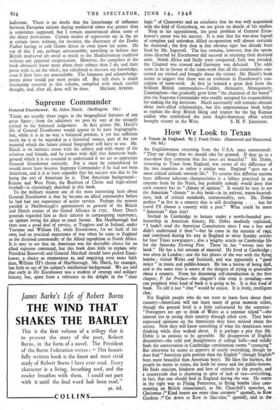• Supreme Commander
General Eisenhower. By Alden Hatch. (Skeffington. 16s.) THERE are usually three stages in the biographical fortunes of any great figure ; from the adulatory we pass by way of the savagely critical to the balanced judgement. At first glance Mr. Hatch's life of General Eisenhower would appear to be pure hagiography, but, while it is in no way a balanced portrait, it yet has sufficient merit for it to be regarded as a historical source, part of the raw material which the future critical biographer will have to use. Mr. Hatch is on intimate terms with his subject and with many of his relatives and friends, and he evokes with skill that American back- ground which it is so essential to understand if we are to appreciate General Eisenhower correctly. For it must be remembered he would never have become Supreme Commander if he had not been American, and it is at least arguable that his success was due to his being the sort of American he is. That American background— Kansas and West Point, the Brethren of Christ and high-school football—is charmingly sketched in this book. To the military student one of the most interesting facts about General Eisenhower is that he became an allied commander before he had had any experience of active service. Perhaps the nearest parallel is Marlborough's appointment as general of the British and Dutch armies of the Grand Alliance in 1702. Many Dutch generals regarded him as their inferior in campaigning experience, an upstart owing his place to court favour. But Marlborough had then seen a good deal of service, at Tangiers and in Ireland, under Turenne and William III, while Eisenhower, for no fault of his own, had no practical experience of war when he came to England as the destined commander of the Allied expedition to North Africa. It is easy to see that an American was the desirable choice for an allied supreme command, but this book does little to explain why President Roosevelt and General Marshall should have picked Eisen- hower, a choice as momentous as, and requiring even more faith than, William III's choice of Marlborough. Mr. Hatch, for example, has little to say of his subject's 'intellectual background. We are told that early in life Eisenhower was a student of strategy and military history, but, apart from a reference to his delight in the "clear logic " of Clausewitz and an assurance that he was well acquainted with the field of Gettysburg, we are given no details of lis studies. Next to his appointment, the great problem of General Eisen- hower's career was his success. It is true that the war-time legend of complete and unbroken Allied co-operation will almost certainly be shattered ; the first shot at this obvious tiger has already been fired by Mr. Ingersoll. The fact remains, however, that the opera- tions directed by Eisenhower did succeed in attaining their destined aims. North Africa and Sicily were conquered, Italy was invaded, the Channel was crossed and Germany was defeated. The odds seem to be in favour of the team-work that all the commanders con- cerned say existed and brought about the victory. Mr. Hatch's book seems to suggest that there was an evolution in Eisenhower's con- ception of team-work. At first he learned a great deal from the brilliant British commanders—Tedder, Alexander, Montgomery, Cunningham—but gradually grew from " the chairman of the board " into the Supreme Commander who readily accepted his responsibility for making the big decisions. Much necessarily still remains obscure about inter-allied relationships, but this unpretentious book helps to explain the deep British liking and respect for the big Kansan soldier who symbolised the joint Anglo-American effort which






























 Previous page
Previous page